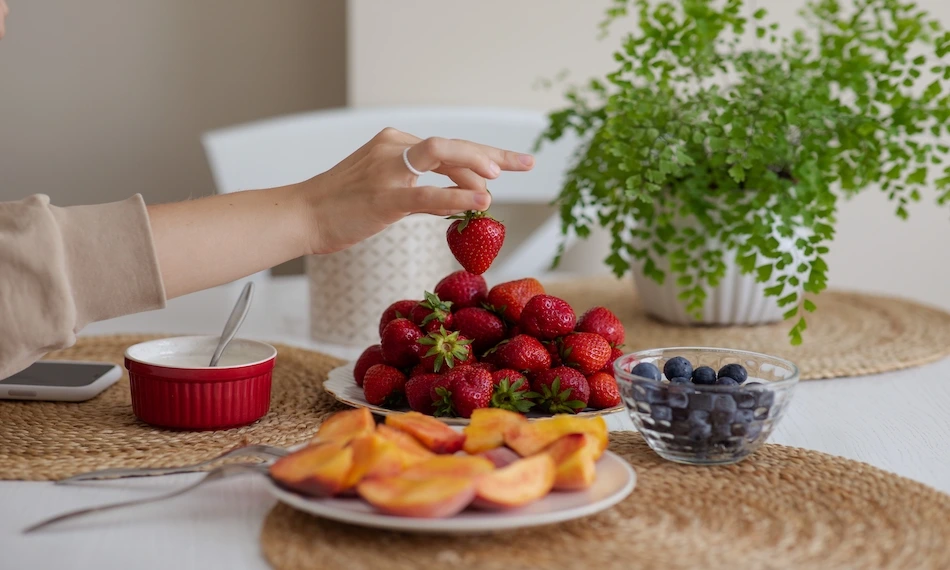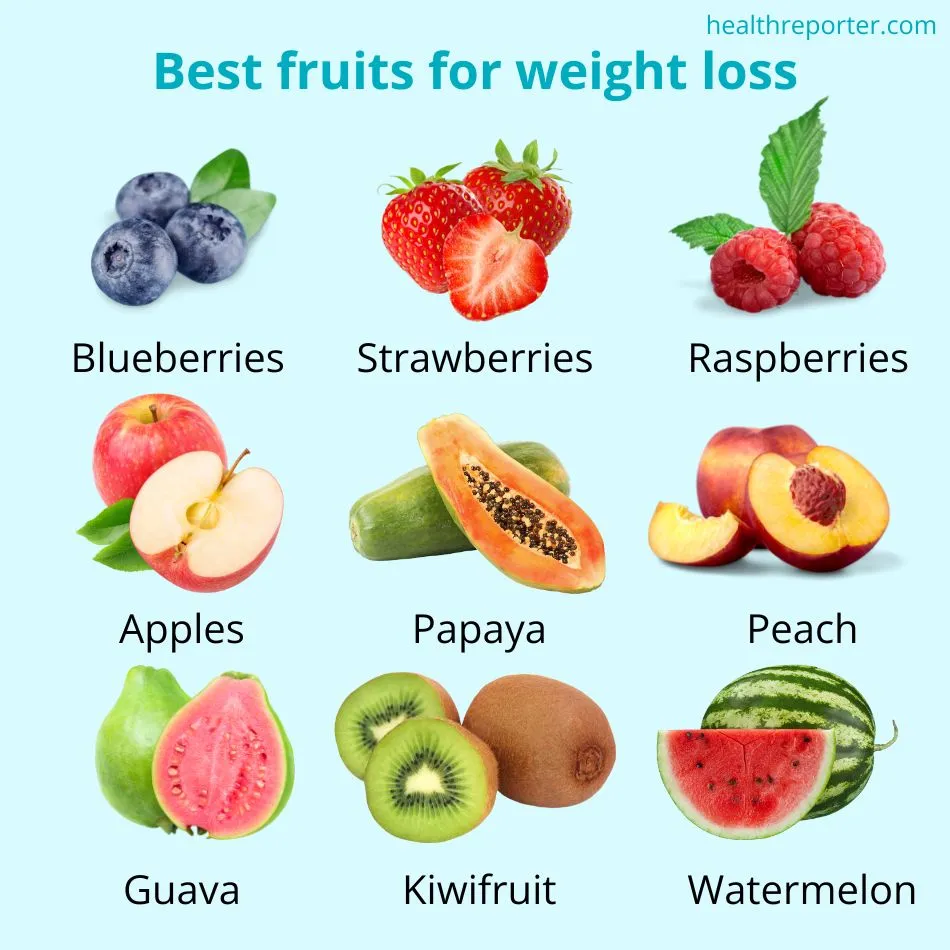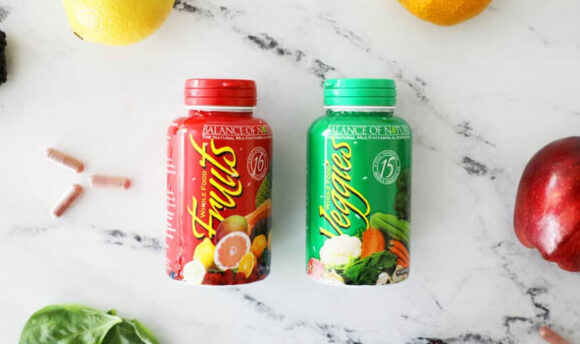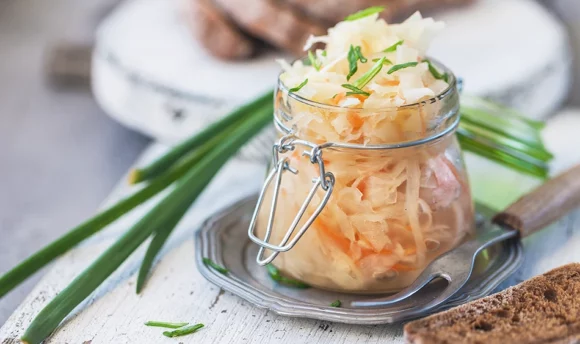15+ Best Fruits for Weight Loss: Get Healthy With Nature’s Ready-Made Snacks
While they may be high in sugar, we explain how fruits should have a solid place in any weight loss diet

Ever heard that famous saying, “An apple a day keeps the doctor away?” This actually rings true for a wide range of fruits, from berries and melons to avocados and tomatoes.
Some fruits are low-calorie yet high in fiber and other important vitamins that lower your risk for heart disease, maintain stable blood pressure, and help keep you healthy. These properties also make some fruits a great addition to any weight loss diet.
But how do you know which varieties of nature’s treats won’t break the daily calorie bank? We explore the best fruits for shifting those pesky pounds and how you can incorporate them into a healthy diet.
15+ Best Fruits for Weight Loss: Slim Down With Smart Choices
Although full of carbs, there are several reasons why fruit makes a great addition to your diet when trying to lose weight.
For instance, eating fruit is important for getting more fiber each day. Fiber promotes weight loss by slowing stomach emptying, keeping you fuller for longer, and indirectly lowering your calorie intake. In turn, this may help you maintain a caloric deficit.

However, not all fruits are created equal, so here are our top picks for losing weight:
#1 Blueberries
In general, berries are lower in sugar and carbohydrates than many other fruits, such as bananas, mangoes, and grapes. This means that they are perfect for a low-carb weight loss regime like the keto diet.
However, blueberries stand out specifically, as they have one of the highest antioxidant contents of all fruits and vegetables and may directly increase your body’s antioxidant levels. These compounds help fight free radicals, harmful toxins in the body that are associated with aging, stress, and diseases such as cancer.
Blueberries are also incredibly nutrient-dense, boasting 3.6 grams of fiber, yet only 84 calories per cup.
#2 Strawberries
If you’ve got a sweet tooth but no longer want to rely on candy for your fix, strawberries are a great low-calorie, lower-sugar swap. In fact, one cup of strawberries provides under 50 calories and an impressive 3 grams of fiber.
Along with making a delicious snack, strawberries contain a huge variety of essential nutrients, including 99% of your daily value (DV) for vitamin C and 26% of the DV for manganese.
Manganese is a trace nutrient and important mineral containing antioxidants that fight inflammation, help your body utilize important nutrients, and may also stabilize blood sugar levels, which can play a role in appetite regulation.
#3 Raspberries
With one-third of your daily fiber needs per serving, raspberries are one of the best berries for losing weight and keeping you healthy while on this journey.
Along with plenty of inflammation-fighting vitamin C, they’re also loaded with anthocyanins. These are antioxidants that give raspberries their vibrant red color and can help lower blood pressure, reduce the risk of heart disease, and even protect brain function as you age due to their anti-inflammatory effects.
Raspberries are also a natural source of ellagic acid, which studies show may protect against certain types of cancer.
#4 Plums
Plums are a type of drupe, a seasonal stone fruit with a fleshy exterior and pit inside.
They are very low in calories, with one small plum containing only 30.4 calories, and are a low glycemic index (GI) food, making them an ideal inclusion in diets for diabetes control and healthy weight loss.
Plums have also been shown to potentially contain over twice the amount of polyphenol antioxidants as some other fruits. These are compounds with impressive anti-inflammatory effects, which may help prevent cancer, diabetes, and obesity in both fresh and dried plums, known as prunes.
#5 Cherries
Cherries are another addition to the drupes family that can be handy for weight loss. One cup provides just 87 calories, along with plenty of potassium, vitamin C, and antioxidants.
In one review, it was found that these stone fruits reduce markers of oxidative stress in 8 out of 10 studies, a condition associated with many chronic diseases such as obesity. Additionally, in 11 out of 16 studies, cherries lowered inflammation, a condition that can be triggered by an excessive accumulation of fat in the body.
#6 Apples
When eaten whole rather than juiced, apples have been shown to increase satiety and reduce appetite. This is likely because they are filled with around 5.4 grams of fiber per large fruit, making apples a great contribution to your daily fiber intake.
These sweet fruits can aid weight loss as they contain other beneficial plant compounds, such as polyphenols, which prevent the accumulation of fat around the organs. For added health benefits, we’d recommend leaving the peel on, as apple peel is packed full of antioxidants that could potentially lower your risk of obesity.
#7 Papaya
Not only is papaya a delicious, sweet tropical fruit, but it also has several benefits for weight loss. Along with containing only 62 calories per cup, papayas have a high water content, which can satisfy your appetite without filling up on empty calories.
A single cup offers 3 grams of fiber, as well as free-radical-fighting antioxidants like vitamin C, lycopene, and beta carotene. What makes papayas unique is the enzyme papain, which breaks down proteins, can improve digestion, and may be useful in preventing and treating obesity.
However, it’s worth pointing out that there is currently little evidence to confirm the effects of papain for weight loss in humans.
#8 Peaches
Like plums and cherries, peaches are another variety of stone fruit that work well as a snack for weight loss or can be added to salads, desserts, and even curries. Peaches contain around 2 grams of fiber per fruit, half of which is soluble.
When mixed with water in the body, soluble fiber forms a gel that slows digestion and can, therefore, keep you feeling full. It may also lower levels of ghrelin, a key hunger hormone, thereby reducing your appetite.
Studies show that the polyphenols within peaches may protect against obesity-induced disorders such as insulin resistance and high blood sugar, although these effects have only been observed in rats.
#9 Kiwifruit
Containing high levels of vitamins C, K, and folate, research into the weight loss benefits of kiwifruit is pretty extensive. When eaten twice per day for 12 weeks, these small brown fruits helped people with prediabetes lose 1.2 inches from their waist while also lowering their blood pressure.
While kiwifruits are traditionally eaten peeled, which packs in over 2 grams of fiber, leaving the skin on adds an extra 1 gram, helping increase fullness, reduce appetite, and support weight loss. Like many of the other low-calorie fruits on our list, kiwi is also low GI, which causes only small blood sugar spikes, helping regulate your energy and hunger levels.
#10 Guava
Guavas may be small, but they certainly pack a punch when it comes to nutrition, with just 37 calories per fruit and 12% of your daily recommended fiber intake. Containing nearly twice the amount of an orange, they are also one of the best sources of vitamin C and other important antioxidants that keep you healthy while losing weight.
Eating guava fruits regularly may also help lower blood sugar levels and improve insulin resistance, which may prevent hunger pangs and cravings. One study found that consuming guava after a meal reduced blood sugar for up to 2 hours. However, in this study, subjects drank guava leaf tea rather than eating a whole fruit.
#11 Pears
Thanks to the rise of trendy superfruits like acai berries and avocados, pears are often overlooked. However, with around 6 grams of fiber per fruit and a high water content, they have a solid place on our list for their ability to prevent weight gain.
For example, one study found that adding pears to your diet can help reduce energy consumption and lower body weight over time, particularly when compared with oats.
While they’re great for weight loss, pears stand out mostly for their other health benefits. They’re known for being rich in polyphenols, plant compounds with antioxidative properties that lower the risk of diabetes, stroke, and a whole host of other chronic diseases. Remarkably, you can find up to 6 times more polyphenols in the peel, so be sure to always eat the whole pear.
#12 Oranges
Low in calories and renowned for their fiber content, oranges provide approximately 10% of your daily recommended value per fruit. They are also incredibly high in vitamin C, a nutrient that performs many vital functions in the body, from absorbing iron to maintaining a healthy immune system.
While whole fruits may be more filling, drinking freshly squeezed orange juice can be a convenient way of including a huge range of essential vitamins and minerals in your diet. We’d suggest leaving the pulp in, as this part of the orange contains large amounts of fiber, while preventing blood sugar spikes and moderating the body’s insulin response.
However, avoid processed supermarket varieties and try to consume orange juice in moderation, as it does contain large amounts of sugar.
#13 Grapefruits
Grapefruit, another tangy citrus fruit, makes a great addition to your breakfast, salads, or snacks, thanks to its low calorie count. Despite containing just 37 calories, half a grapefruit is packed with 51% of your daily recommended intake of vitamin C.
Vitamin C has antioxidant properties that protect your body from various conditions, from the common cold to chronic and age-related diseases like cancer, heart disease, and cataracts.
By releasing sugar slowly into the bloodstream, grapefruits are considered to be a low glycemic index (GI) fruit. This may keep you fuller for longer, which is helpful when it comes to losing weight.
#14 Watermelon
At 46 calories per cup serving, watermelon is one of the lowest calorie types of melon available, making it the perfect refreshing weight loss snack. However, it is on the higher end of the glycemic index, so you should try to eat this fruit in moderation.
One of the biggest benefits of eating watermelon is that it has around 91% water content. Staying hydrated can help suppress your appetite and may increase fat metabolism, both of which are important in terms of weight loss.
It also contains lots of lycopene, a powerful antioxidant that may help lower your risk of obesity, as well as chronic conditions such as heart disease.
#15 Melon
Melons are a great weight loss snack choice as they contain around 60 calories per cup, depending on the type you choose. In addition to their substantial fiber content, melons are rich in antioxidant vitamin C and potassium, an electrolyte that helps maintain fluid balance and control blood pressure.
Combined with melon’s high water content, the potassium ensures that you remain hydrated and healthy during your weight loss journey.
You’ll also find lots of vitamin A and niacin in each portion of melon. Niacin, or vitamin B3, is particularly great for weight loss, as it plays a key role in converting food into energy. It also reduces inflammation, may increase levels of “good” HDL cholesterol, and reduce “bad” LDL cholesterol.
#16 Pineapple
Pineapple is a tangy tropical weight loss fruit packed with bromelain. This is an enzyme that breaks down protein, helps with nutrient absorption, and aids lipolysis, the process where stored fat is broken down.
Like many of the other fruits we’ve explored, pineapple chunks are low in calories and fat yet high in fiber, with more than 2 grams of this vital nutrient per portion. They are also rich in manganese, a mineral with antioxidant properties that plays several key roles throughout the body, from aiding digestion to producing energy.
#17 Avocado (yes, it’s a fruit!)
Although they’re typically eaten as part of a savory meal, avocados are actually a fruit. They’re an excellent source of dietary fiber, with 6.7 grams per 100g, and are high in monounsaturated fats.
These heart-healthy fats keep you fuller for longer and reduce your risk of cardiovascular disease, especially if selected in place of saturated fats like butter and processed meats.
When eaten as part of the keto diet, avocados can help your body utilize fat as fuel and have been shown to be effective in preventing weight gain. However, you should keep in mind that they are relatively high in calories, so they should be consumed in moderation to maintain a calorie deficit.
#18 Tomatoes (another surprising fruit)
Tomatoes are a sweet, juicy fruit usually eaten as part of a savory meal, yet they provide similar weight loss benefits as many other fruits. For instance, tomatoes contain approximately 95% water, with the rest being mainly insoluble fibers.
Along with preventing constipation, the calories within insoluble fiber aren’t digested by the human body like other macronutrients are, such as proteins and fats. It can, therefore, help to satisfy your appetite without adding extra calories to your meal.
Like watermelon, tomatoes are also rich in the antioxidant lycopene. This increases levels of leptin, a hormone that signals to your body when you’re full and can stop you from overeating. Studies show that eating tomatoes may reduce your body mass index (BMI) and act as a preventative against obesity.
Portion Control and Moderation
Luckily, fruits tend to be low-calorie, so consuming your 5-a-day combined with vegetables shouldn’t be a hindrance. While all of the fruits we’ve included in this guide can help with weight loss, this can only be achieved if you are mindful of how much of each fruit you’re eating.
Some types, such as avocados, are higher in calories and fats, so it’s important that you only eat them in moderation. For instance, if you’re on the keto diet, you shouldn’t exceed more than one avocado per day.
Most fruits are also high in sugar, which, when consumed in excess, can cause obesity, diabetes, and heart disease. To prevent this, try to eat no more than 2 to 3 servings per day, with one serving being a whole apple or a cup of sliced strawberries, for example.
We’d also recommend limiting your intake of fruit juices, as drinking them increases your risk of over-consuming fruit and sugar. If you fancy this tasty treat, avoid supermarket varieties that are often packed full of added sugars and make your own freshly squeezed juice.
Ultimately, the best way to be mindful of your fruit consumption is by eating it as part of a balanced meal, with a protein source, complex carbohydrates, and some healthy fats to keep you fuller for longer.
Other than eating a piece on its own as a healthy alternative to sugary or fatty snacks like candy or chips, some exciting examples of how to eat your fruit include:
- Added into salads
- As an oatmeal topping
- With Greek yogurt and peanut butter
- In green smoothies
- As part of a healthy dessert
A Word From Our MD


Whether you’re hoping to lose weight fast or slowly and steadily, you’ll need to be in a calorie deficit. In short, this requires burning more calories than you consume, and you will, therefore, need to stick to a daily calorie allowance.
The number of calories your body requires to drop the pounds varies from person to person, and you can calculate the right amount for you using a calorie calculator or weight loss app. All types of food can be consumed in moderation, but you should focus on making weight loss foods such as fruits, vegetables, lean proteins, and whole grains the main part of your diet.
Although eating a balanced diet is essential, you should also build a regular workout routine, get plenty of sleep, and stay hydrated to successfully lose weight.
FAQs
Thanks to its unsaturated fat content, eating avocado as part of a high-fat, low-carb diet can trigger the fat-burning state of ketosis. This is when the body begins to use fat for fuel rather than glucose. However, avocados are relatively high in calories, so be mindful of portion sizes if you’re trying to lose weight.
Fruits do not directly burn belly fat, but eating them as part of a calorie-controlled diet can help you lose weight and shift fat from that stubborn midsection. Some of the best low-calorie fruits for this include berries, apples, grapefruit, oranges, pears, and melon.
Watermelon is an ideal weight loss food as it has a large water content, which helps satisfy your appetite with fewer calories. However, it does have a high glycemic index (GI), meaning it causes a rapid rise in blood sugar and may not keep you full for as long as some other fruits.
Fruit is generally good for weight loss as it is low-calorie and high in fiber, a nutrient that keeps you fuller for longer. However, you should be mindful of how much fruit you’re eating, as ultimately, you’ll need to maintain a calorie deficit to lose weight.
Yes, apples make a great snack as part of a weight loss diet because they contain lots of fiber, which helps maintain a healthy digestive system and can reduce your appetite. Apples are also packed full of antioxidants and polyphenols that prevent visceral fat accumulation and lower your risk of obesity.
If you’re trying to lose weight, include oranges in your diet as a low-calorie snack. They are high in fiber and vitamin C, keeping your digestive and immune systems functioning optimally. While orange juice offers some of the same benefits, it can be easy to overconsume, so be mindful of portion sizes and drink only freshly squeezed varieties.
Conclusion
The best fruits for weight loss are low-calorie, high-fiber, and packed full of essential vitamins, minerals, and antioxidants that keep you healthy and satisfy your sweet tooth while you’re trying to shed those pounds.
Despite their health benefits, fruits do contain large amounts of sugar, so it’s important to be aware of recommended serving sizes. To prevent overeating, choose whole fruits over juices and include fruit as part of a balanced meal with a protein source, complex carbohydrates, and small amounts of healthy fats.
Remember, although keeping your diet healthy is crucial for weight loss, there are many other factors to consider when it comes to maintaining overall wellness, from exercising to getting enough sleep.

















































 Select your language:
Select your language: 







